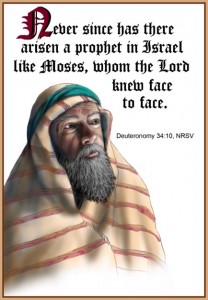Another Year of Choices
By Barbara Dahlgren
 Moses was a meek man. God chose him to lead Israel out of Egypt. He parted the Red Sea. God gave him the Ten Commandments. Those in the campground who occasionally caught a glimpse of Moses as he passed would probably say, “There he is. That’s Moses. He’s the one. He’s God’s servant. He’s a great and mighty man.” But what if the only time they saw him was when he was so upset he struck the rock. Would they think, “What an angry man! How could God use him?”
Moses was a meek man. God chose him to lead Israel out of Egypt. He parted the Red Sea. God gave him the Ten Commandments. Those in the campground who occasionally caught a glimpse of Moses as he passed would probably say, “There he is. That’s Moses. He’s the one. He’s God’s servant. He’s a great and mighty man.” But what if the only time they saw him was when he was so upset he struck the rock. Would they think, “What an angry man! How could God use him?”
David was a man after God’s own heart. He sought God’s will in his life. With godly confidence, he slew the giant Goliath. He wrote the Psalms. God chose him to replace Saul as king. When David walked through his kingdom, people might catch a glimpse of him and say, “There he is. That’s King David. He’s God’s servant. He’s a great and mighty man.” But what if the only time they saw him was when he was having a secret rendezvous with Bathsheba? Or when he gave the command to send her husband Uriah to the front lines of battle to be killed? Would they say, “What an unjust man! How cruel and insensitive he is! How could God ever use him?”
Elijah was a renowned prophet. He communicated with God. He passed God’s words on to the people. He called fire down from heaven. He humiliated the prophets of Baal. When people caught a glimpse of Elijah in the countryside they would be in awe of him. “There’s Elijah,” they might whisper. “He’s a great and mighty man. He’s a true servant of God.” But what if the only time they saw him was when he was fleeing from Jezebel or hiding in the cave for fear of his life. Would they say, “What a coward! He’s a wimp. How could God ever use him?”
How could these great servants of God be parting the Red Sea, killing a giant, calling fire down from heaven one day and be angry, unjust, frightened the next? The answer is simple. They were human. And therein lies the problem if we try to make “idols” out of Christian leaders, or friends, or relatives, or anyone. They are all human. They have clay feet. They will eventually disappoint us.
Maybe that’s why God tells us not to compare ourselves among ourselves or not to judge others. (2 Corinthians 10:12, Matthew 7:1) We must look to God foremost. Then we must look for the good in those who strive to serve and obey Him. For how can we truly know the “whole” of a man when we only see one small part of him? Only God sees a person in all his seasons of life.
Here’s a little parable to keep in mind…
The Tree in All Its Seasons
Once an ancient Persian king wanted to discourage his four sons from making rash judgments. At his command, the eldest made a winter journey to see a mango tree. Spring came and the next eldest was sent on the same errand. Summer followed and the third son went. When the youngest boy returned from his autumn visit the king called them together to describe the tree.
The first said, “It looks like a burnt old stump.”
The second disagreed, “It was lacy and green.”
The third declared, “No, it had blossoms as beautiful as a rose.”
The fourth said, “You are all wrong, it has fruit like a pear.”
“Each is right,” said the king, “for each of you saw the tree in a different season!”
And so it is that when we hear or view another’s thoughts or actions we should withhold judgment until we are certain. Remember this fable. We must “see the tree in all its seasons.”
Suggestions for practicing this choice…
- Love people instead of judging and condemning them.
- Show yourself some love by not judging and condemning yourself.
- Don’t compare yourself to others. You do not see or know the whole story of their lives.
- Don’t put people on pedestals. They are only human.
- Look to God foremost. He is the only one to be lifted above others.


